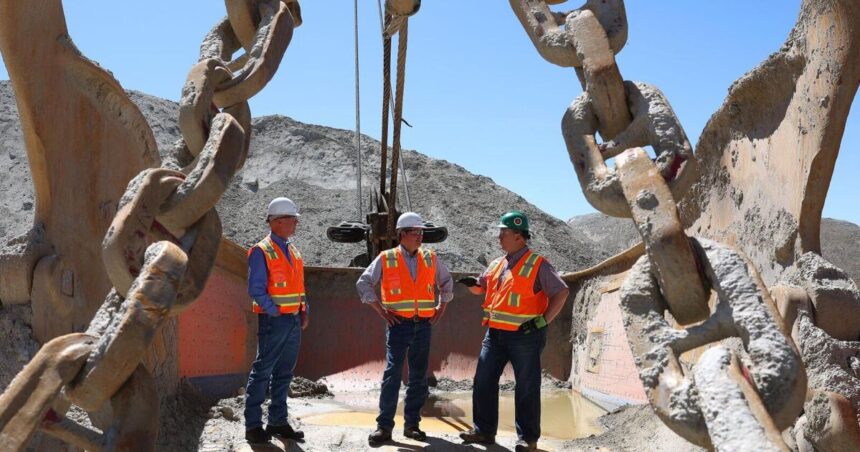Actions by President Joe Biden’s administration that could accelerate the closure of heavily polluting coal power plants and the mines that supply them are reigniting Republican claims of a “war on coal” in light of the upcoming November election.
The epicenter of the political debate surrounding coal is in the Powder River Basin of Wyoming and Montana, a sparsely populated region with the largest coal mines in the country. This area is also home to the Colstrip, Montana power plant, which emits more toxic air pollutants like lead and arsenic than any other facility of its kind in the U.S., according to the Environmental Protection Agency.
The EPA recently implemented rules that could result in the closure of the Colstrip Generating Station or require an estimated $400 million for emissions clean-up within the next few years. Another proposal from the U.S. Interior Department would halt new leasing of taxpayer-owned coal reserves in the Powder River Basin, casting uncertainty over mines like Westmoreland Mining’s Rosebud Mine, which supplies about 6 million tons of fuel annually to Colstrip.
People are also reading…
During his first presidential campaign eight years ago, Donald Trump capitalized on populist sentiment against government regulation by highlighting measures against coal enacted under former President Barack Obama. The recent actions against coal have once again brought this issue to the forefront for Republicans aiming to challenge Biden in the November election. Some Democrats in coal-producing states also have reservations.
“This influx of new regulations will result in job losses and harm communities like Colstrip,” stated Montana Republican Sen. Steve Daines during a visit to Rosebud Mine this week with Republican Gov. Greg Gianforte. “The only thing that can change this outcome is an election and a new administration.”
Coal consumption in the U.S. has seen a significant decline over the past decade as natural gas and renewable energy became more affordable. However, the political significance of coal remains strong as opponents seek to further restrict its use due to its contribution to climate change and air pollution.
Coal remains an economic pillar in communities like Colstrip, providing jobs where workers can earn up to $100,000 annually, according to union representatives.
The Biden administration has defended the recent restrictions on coal as necessary to reduce harmful pollutants, improve public health, and address court rulings regarding climate change.
A representative from the Biden campaign pointed out that coal’s decline continued during Trump’s presidency.
“There is no war on coal, there is only a fight for our energy future,” said campaign spokesperson James Singer. “Under President Biden, the United States is closer to energy independence than we have been in decades.”
Despite the ban on new coal leases, companies already hold leases for over 4 billion tons of coal on federally owned lands. Administration officials believe this is sufficient to sustain mining operations for decades to come.
Supporters of the crackdown on pollution from coal plants argue that it was long overdue. The origins of these efforts date back to 1990 amendments to the Clean Air Act, which tasked the EPA with setting standards for pollution reduction technologies.
Dr. Robert Merchant, a pulmonologist from Billings, highlighted research indicating that pollution from Colstrip and similar plants is linked to various health issues such as cancer, developmental delays in children, and heart attacks.
“Large industries like Colstrip are adept at understanding the economic impacts on their bottom line. Unfortunately, the health effects don’t factor into their financial calculations,” Merchant stated.
Representatives from the Northern Cheyenne Tribe had urged the Biden administration to implement pollution regulations to safeguard air quality on their reservation just south of Colstrip.
The Colstrip plant, which began operations in the mid-1970s and underwent expansions, looms over the town of Colstrip, home to around 2,000 residents. It is connected to the Rosebud Mine via miles of conveyor belts that transport coal to the 1,480-megawatt plant, where it is burned to generate electricity for distribution across the state.
Brian Bird, president of NorthWestern Energy, a co-owner of Colstrip, disputed EPA Administrator Michael Regan’s characterization of Colstrip during Congressional hearings as the “highest emitter in the country,” citing the plant’s size as one of the largest coal plants in the western U.S. Bird argued that Colstrip ranked “in the middle of the pack” in terms of pollution per megawatt of power generated.
Some prominent Democrats have criticized federal agencies for moving too aggressively against coal.
Montana Democratic Sen. Jon Tester expressed concern that the EPA rules could cost Colstrip hundreds of millions of dollars to comply. In West Virginia, Democratic Sen. Joe Manchin accused Biden of trying to gain political points in the short term by issuing these rules during an election year.
Tester, considered one of the most vulnerable Democrats in the Senate, is facing a tough re-election battle. His Republican opponent, Tim Sheehy, criticized the “Biden Tester climate cult” following the announcement of the ban on new coal leases. Tester’s spokesperson, Eli Cousin, stated that the senator was reviewing the administration’s proposal.
Manchin, who is not seeking re-election when his term ends in January, will be succeeded by either Republican Gov. Jim Justice or Democrat Glenn Elliott, the mayor of Wheeling, West Virginia. The EPA rules could sway voters towards Justice, as he faces Elliott in the election.
Elliott has advocated for more green energy in West Virginia but has not commented on the EPA rules.
EPA officials have committed to collaborating with the owners of the Colstrip plant to find a way forward in response to concerns raised by Tester and other lawmakers. The agency reported that 93% of coal-fired plants have demonstrated the ability to comply with the new air pollution standards.





